
The Tribal Development Fund Project (2011-2018) was implemented by SEED in Husnabad Mandal, Karimangar district, from 2011 to 2017. The project aimed to uplift 500 tribal families through horticulture crops, providing bore wells, motors, and PVC pipes for irrigation in fallow lands. The project also enhanced the horticultural ecosystem by providing teak, glyricidia, and agave suckers for bordering and protecting horticulture areas.
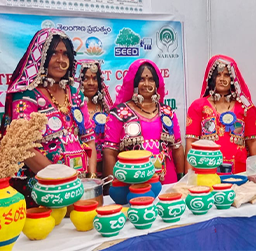
Training and capacity-building sessions were provided for tribal families, focusing on crop protection, health, and nutritional values. Livelihood enhancement included sheep-rearing units, dairy animals, backyard poultry, and kitchen gardens. The project also addressed health issues by implementing fogging to reduce mosquito populations. Key results include community water sharing, economic impact from mango and sapota cultivation, inter-crop income generation, mitigation of seasonal migration, health expenditure reduction, open defecation eradication, cultivation of fallow land, and horticulture model replication. The project also enhanced access to line departments and research organizations, promoting collaboration and ensuring the project's sustainability.
The Watershed Development Fund Project (2010-2015) was implemented in two watersheds in Nawabpet Mandal, Telangana state, from 2010 to 2015. The project covered 2880 hectares and benefited 6850 families. SEED provided training and capacity building to farming communities, landless families, and women, focusing on soil conservation and water conservation through structures like check dams, percolation tanks, farm ponds, rock-fill dams, dug-out ponds, sunken ponds, and nursery growing.
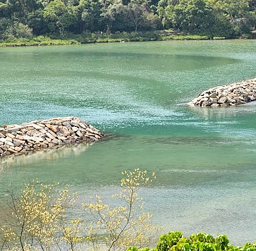
The project also involved activities like horticulture crop cultivation, bund plantation, and promotion of farm bunding and contour trenches. The project also provided training to farmers and women on micro-irrigation, vermicompost, organic farming, and mulching. The project planted 2,56,800 trees and provided horticulture and floriculture crops to 96 families. The project also uplifted Dalit communities by incorporating initiatives like tank silt application to improve soil depth. Key results included 260 hectares of cultivation, increased soil depth, flood velocity arrest, and improved groundwater levels. Livelihood families experienced increased income, and 456 families experienced increased productivity and income. The project also successfully arrested daily and seasonal migration, resulting in 22 families returning to their villages.

SEED NGO has implemented climate adaptation and mitigation programs to promote sustainable agriculture. These include demonstrations on pulse cultivation, non-pest management practices, and training on soil health. SEED has distributed soil health cards to 452 farmers, trained them on crop water budgeting, mulching, and micro-irrigation systems. Additionally, tank silt application was provided to 240 farmers in eight villages. Green SIM cards were provided to enhance agricultural extension services and access weather forecasts. Video conference training programs were conducted at the Krishi Vigyan Kendra, and demonstrations on food security crops were organized in Watershed villages. Key results include 225 families reducing fertilizer use, 90% adopting mulching methods, and 70% using micro-irrigation methods. These changes have led to increased productivity, reduced cultivation costs, and increased income.
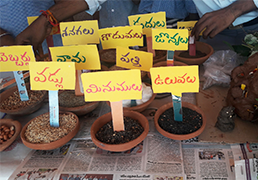
SEED NGO has implemented a program in 16 villages in Vikarabad and Dharur mandal, Telangana state, to increase the cultivation of minor and major millets and protect the environment. The program provided training and capacity building to farmers on millet cultivation, and distributed millets like Jowar, Finger Millets, and Foxtail. This led to farmers covering 250 to 400 acres in the villages, expanding their millet crops and participating in training programs on processing and food technologies related to millets
SEED, with the support of the Telangana State Biodiversity Board, is establishing 12 People's Biodiversity Registers in 28 villages in the Dharur, Parigi, and Vikarabad mandals of the Vikarabad district and an extension to 16 villages in the Nangunoor Mandal of the Siddipet district.
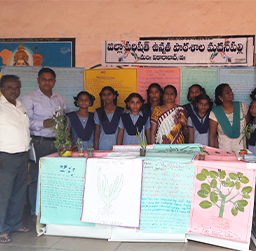
SEED is using participatory tools like Participatory Rural Appraisal, Rapid Rural Appraisal, door-to-door surveys, and transect walks to analyze trends and gather primary data on seasonality and livelihoods. The initiative also aims to strengthen community engagement in resource conservation, educating them about the Biodiversity Act and clarifying local bodies' entitlement to royalty income derived from bio resources. Key results include sensitizing People and Biodiversity Management Committees to the provisions of the Biodiversity Act, conducting trend analysis to identify gaps in bio resource utilization, and identifying potential income sources to bridge these gaps. The initiative aims to address issues surrounding bio resources, including aggro-biodiversity, forest biodiversity, tank biodiversity, and land use patterns.
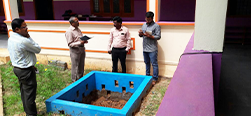
Since 2015, SEED NGO has collaborated with Hyderabad Metro Water Supply and Sewerage Board, promoting rainwater conservation through annual awareness programs and participating in World Water Day celebrations by renovating and constructing Rainwater Harvesting Structures.
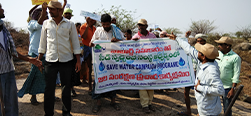
The "Krishi Jal Samvaad" water campaign targeted 51 water-stressed villages in Karimnagar, Sircilla, and Siddipet districts, focusing on water conservation and educating on rainwater harvesting, groundwater recharge, and agronomic practices, and submitted an actionable plan to NABARD.
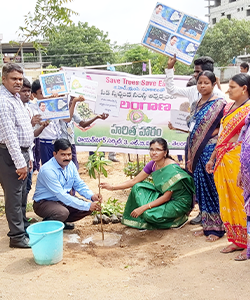
SEED, with the support of the Urban Biodiversity Development Wing in GHMC, has initiated a significant program to plant vegetation in 26 colonies in Telangana's Rangareddy district. The program has planted 12,350 plants, with SEED also participating in plantation programs in schools, government institutions, and poor greenery colonies. The initiative has been facilitated by collaboration with Residential Welfare Associations and community-based organizations. The team engaged with residential welfare associations to understand plant selection preferences, identified planting sites, and conducted pre-planting operations. The community took responsibility for planting and after-care, including protection measures. SEED actively monitored the planting process and advocated for suitable plant species from the Director of Urban Biodiversity. The community has embraced ownership and responsibility for the plants, resulting in a commendable survival rate in the colonies.
The Hyderabad Metro Water Supply and Sewerage Board (HMWSSB) has launched awareness campaigns targeting Residential Slum Level Federations, focusing on the Safai Surksh Mitra Challenge. These campaigns emphasize the importance of responsible waste management and the environmental impact of waste sludge drawing in the vicinity of colonies.

SEED educates communities about the appropriate dialing numbers to access authorized septic tankers for routine cleaning, reducing dependence on private tankers.The pilot project, which involved collecting data on septic tank status in GHMC Hayathnagar, was successfully completed. The results showed that 85% of the colonies are using em-paneled septic tankers for waste management, with 65% of these tankers providing livelihood opportunities. Additionally, em-paneled tankers have reduced drainage overflow issues, improved sanitation conditions, and reduced health expenditures, demonstrating the effectiveness of utilizing em-paneled septic tankers for waste management in GHMC Hayathnagar. The initiative has also led to reduced health expenditures, highlighting the positive impact on the community's overall well-being.

SEED, with the help of GHMC and Technical Assistance from Administrative Staff College of India, has launched a comprehensive initiative aimed at raising awareness about proper waste segregation through door-to-door collection methods. The initiative has reached 12,650 houses in 96 colonies, successfully reduced vulnerable garbage points, achieved a commendable adoption rate of 85-90% for dry and wet waste segregation methods, promoted community composting and home composting practices, effectively managed construction and demolition waste, and significantly improved the attendance of Sanitary Action Teams (SAT) autos. The initiative has also increased door-to-door collection efficiency and improved the attendance percentage of SAT autos and Community Resource Persons (CRPs).

SEED has promoted 75 farmers' clubs, raising awareness about their benefits through exposure visits. These clubs focus on vegetable cultivation, fodder cultivation, technology transfer, and knowledge dissemination on Good Management Practices. SEED aims to federate these clubs into Farmer Producer Companies (FPCs), granting them legal recognition and entity status. This strategic approach empowers agricultural communities by facilitating collective action and formalizing operations for enhanced sustainability and prosperity. Key results include increased income from enhanced milk yields from fodder cultivation, and the dissemination of scientific knowledge through vegetable demonstration programs. Many farmers' clubs have unified to form Farmer Producer Organizations (FPOs), diversifying their operations and offering vital services to village farmers and shareholders.
SEED NGO has facilitated the promotion of nine Farmer Producer Organizations (FPOs) with the support of NABARD, aiming to achieve sustainable agriculture by reducing agricultural input costs, enhancing productivity, accessing markets and financial resources, and establishing institutional linkages.
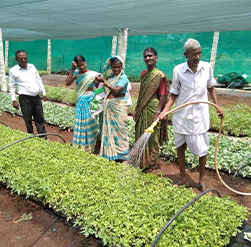
The FPOs have received Business Development Assistance totaling Rs. 30.00 lakhs from NABARD, leading to increased input business and aggregation of produce. FPOs are delivering 75% of input services and facilitating the marketing of produce from their collection centers. SEED has also facilitated convergence assistance for FPOs from IFDC, RAHEZA, and the Horticulture department, procuring manual grading machines, weighing machines, vegetable boxes, and solar dryers. During the COVID-19 pandemic, SEED provided vegetable market support to 1250 vulnerable families, distributed soil health cards, and conducted training and capacity-building programs. The FPOs have also established their own entities by setting up collection centers and input shops.
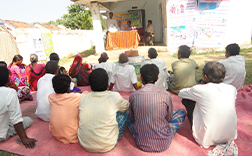
The Bank Mitras initiative employed eight unemployed youth, provided counseling to 100 villages in Telangana, and launched awareness campaigns on account opening and social security schemes. 3,000-5000 new bank accounts were opened, 40% of existing accounts were revived, and 1,200 individuals were covered by social security schemes. Most stakeholders availed the Overdraft facility and received loans.
The Watershed and Tribal Development Fund (WTDF) has extended livelihood opportunities to 295 families, focusing on landless individuals, single women, and those facing economic challenges. The projects include nursery raising, petty shops, salons, pottery, sheep rearing, dairy animals, and the provision of carpentry and masonry tools.
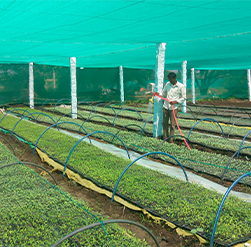
SEED has focused on creating livelihood opportunities for women and farmers through Micro Enterprise Development and Livelihood Enterprise Development projects. Training has been provided to 60 women on basic and advanced tailoring, 90 women on forest nursery management, 210 Women Self-Help Groups (SHGs) on commercial vegetable cultivation, 30 women on vermicompost and dairy techniques, and 90 women on millet cultivation techniques and food processing. The MDP has conducted two batches of training in tailoring and embroidery, with a settlement rate of 67%. The Forest Nursery Management and Raising Techniques program has provided training to 90 women on bed preparation, seed selection, packet filling, watering, and shifting techniques, resulting in increased monthly income and a settlement rate of 70%.

40 farmer members from 8 Joint Liability Groups (JLGs) were trained in dairy development, receiving loans of 2.50 lakhs each to procure milch animals. The Animal Husbandry department provided technical assistance. The Andhra Pradesh Grameena Vikas Bank facilitated collateral loans, extending a total loan of Rs. 20 lakhs to the JLGs. The program's successful implementation increased monthly income for farmers from Rs. 14,000.00 to Rs. 20,000.00 through milk sales.
During the pandemic, SEED initiated awareness campaigns on COVID readiness programs with support partners NGO in Covid Action Collab. They enlightened the community on reducing the COVID wave by adapting guidelines and precautions. SEED also played a proactive role in addressing transport issues for the Muthoot George Foundation, providing medicated vehicles for frontline workers and vaccines from Abdullapur PHC to vaccination centers in GHMC Hayathangar circle. SEED addressed marketing issues faced by marginal and small farmers, providing transportation through mobile autos to facilitate produce transportation. This initiative directly benefited 250 farmers and ensured the continuation of agricultural activities in 8 villages of Nawabpet Mandal, Vikarabad district.
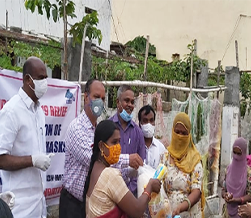
SEED distributed nutritional and dry ration kits to 2,500 vulnerable families and masks to 4,520 families in Telangana state. This initiative was made possible through the support of SWASTI organization, UMEED project, CAC, Dignity Drive Foundation, individual donations, and contributions from other software employees. SEED initiated health interventions by organizing free blood tests for cholesterol, creatinine, sugar, BP, and HBsAg, facilitating awareness among the populace. These efforts benefited 5000 vulnerable families residing in 50 colonies within the Hayathnagar GHMC areas, reducing their health expenditure and alleviating their financial burden in accessing essential healthcare services.
SEED, a non-governmental organization, has been instrumental in eradicating child labor and providing quality education and nutrition to children since its inception. The organization offers merit scholarships to top 10 class students at the mandal and school levels, encouraging economically disadvantaged students through individual and board donations. SEED's leadership has extensive experience in eradicating child labor, and the organization has conducted workshops on child rights issues at the mandal and district levels.
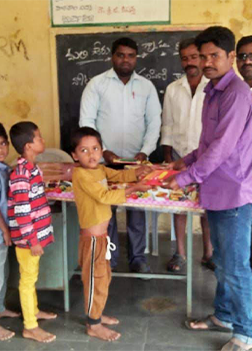
SEED also conducts gender sensitization programs, providing equal wages in projects like the
Watershed Development Project and Tribal Development projects, and extending livelihood
opportunities to women through various enterprise programs. The organization ensures women's
representation on board and empowers them to participate in local governance bodies as per
reservation quotas.
In 2011, SEED conducted the National Environment Awareness Campaign in Hayat Nagar and Vanasthali
Puram areas in Rangareddy district. From 2019 to 2022, SEED conducted the National Hydrology
Awareness program in Vikarabad, Rangareddy, and Medchal districts, facilitating the gathering of
relevant line departments to inform them about the groundwater scenario in Telangana and India,
particularly in drought-prone areas. The program raised awareness about the consequences of
over-exploitation of groundwater and promoted conservation methods and efficient water usage. This
led to more proactive farmers adopting conservation methods, leading to increased income.
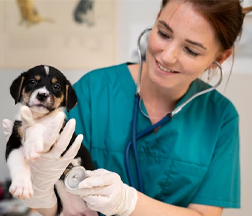
Animal health refers to the well-being and optimal functioning of animals, encompassing both physical and mental aspects. It is a critical component of overall public health, agricultural productivity, and ecological balance. The field of animal health includes the prevention, diagnosis, treatment, and management of diseases and injuries affecting domestic and wild animals. Overall, maintaining animal health is essential for safeguarding the well-being of animals, protecting human health, and ensuring the sustainability of ecosystems and agricultural systems. Collaboration among stakeholders across disciplines and sectors is crucial for addressing the complex challenges facing animal health in the 21st century.